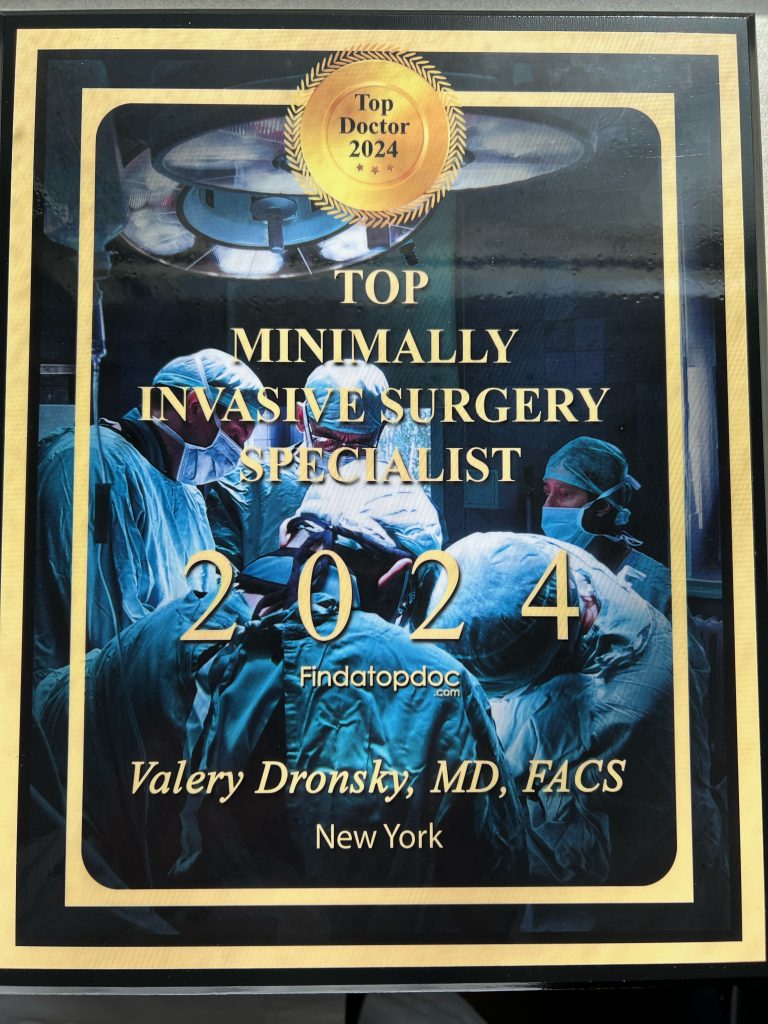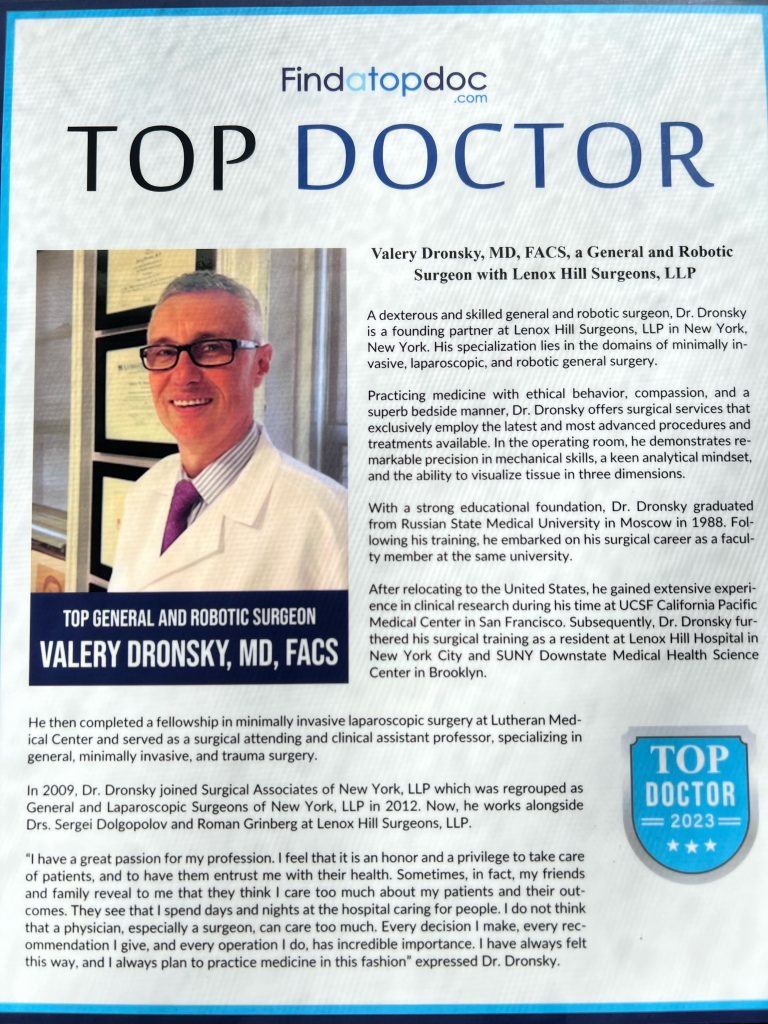CALL TODAY 646-846-1136 | EMAIL
Surgical Experts Dedicated to Improving Lives
At Lenox Hill Minimally Invasive Surgery PLLC, Dr. Valery Dronsky and his staff of medical professionals provide compassionate care with the highest ethical & professional standards. In our state of the art facility, we offer surgical services using only the most cutting edge and current procedures and treatments. We specialize in general surgery, including extensive experience in performing hernia repair surgery. Our expertise is in minimally invasive surgery and robotic surgery. Minimally invasive and robotic surgery often allow patients to experience easier recovery than traditional open surgery. They also allow for more precise and less traumatic surgery. When robotic and minimally invasive surgery is not an option, we are also skilled and experienced in traditional open surgical procedures.
Dr. Dronsky is an experienced and highly skilled surgeon having undergone extensive training in school, residency and fellowships. He practices medicine with ethical behavior, compassion and superb bedside manner. In the operating room he exhibits precision mechanical abilities, analytical thinking and the ability to visualize tissue in three dimensions. These innate and learned skills allow Dr. Dronsky to be one of the most dexterous and skilled professionals in New York City and the Country.
Call us: 646-846-1136
PATIENT TESTIMONIALS
Recent Awards
We are honored and deeply appreciative to have consistently received prestigious awards and recognition year after year, establishing us as one of New York’s foremost hospitals for a wide range of general surgeries, safety measures, specialized procedures, and overall excellence in healthcare. At Lenox Hill Minimally Invasive Surgery, our unwavering commitment lies in delivering exceptional care and unwavering support to our patients, guaranteeing their safety and successful recovery throughout their entire surgical experience.
Hospital Quality Awards
 America’s 50 Best Hospitals Award™ (2023, 2022)
America’s 50 Best Hospitals Award™ (2023, 2022)
Top 1% in the nation for providing the highest clinical quality year over year.

America’s 100 Best Hospitals Award™ (2021)
Top 2% in the nation for consistently delivering clinical quality year over year.

America’s 250 Best Hospitals Award™ (2023, 2022, 2021)
Top 5% in the nation for consistently delivering clinical quality.

Patient Safety Excellence Award™ (2023, 2022)
Top in the nation for providing excellence in patient safety by preventing infections, medical errors, and other preventable complications.
Specialty Clinical Quality Awards

America’s 100 Best Hospitals for Cardiac Care Award™ (2023, 2022, 2021, 2020, 2019)
Superior clinical outcomes in heart bypass surgery, coronary interventional procedures, heart attack treatment, heart failure treatment, and heart valve surgery.

America’s 100 Best Hospitals for Coronary Intervention Award™ (2023, 2022, 2021, 2020, 2019)
Superior clinical outcomes in coronary intervention procedures (angioplasty with stent).

America’s 100 Best Hospitals for Prostate Surgery Award™ (2023, 2022, 2021)
Superior clinical outcomes in prostate removal surgery and transurethral resection of the prostate.
Click to see all of our Healthgrades best doctors awards




Visit our main website at www.LenoxHillMinimallyInvasiveSurgery.com
Blog Posts are Below:
Monthly Archives: December 2019
Types of Pancreas surgery
The pancreas plays an important role in human digestion. One of its major functions is to release the hormones insulin and glucagon that regulate the blood sugar level. The diseases and disorders of pancreas like pancreatitis are less common, and the treatment requires no surgery. However, a surgery is inevitable when treating a severe disorder or removing a tumor.
Types of Pancreas surgery
Open surgery and laparoscopy are the options available for the pancreas surgery. Open surgery involves either the removal of a certain part of the pancreas where the tumor is growing or the removal of other parts of digestive organs as well like gall bladder, stomach, small intestine, and common bile duct. The type of surgery depends upon the stage of cancer.
Whipple Procedure:
Whipple procedure or pancreatic resection involves the removal of the pancreatic head, duodenum of the small intestine, gall bladder and bile duct. This surgical procedure treats pancreatic cancer and other disorders of the pancreas. Whipple procedure is a complex and risky surgical treatment, but very effective and life-saving for treating pancreatic cancer, pancreatitis, bile duct cancer, serious trauma or injury in the pancreas and ampullary cancer.
Distal Pancreatectomy:
The name of the procedure that involves the removal the left side of the pancreas ( body and tail) to eradicate the growing tumor is distal pancreatectomy. Your surgeon might need to remove the spleen attached with pancreas as well.
Total Pancreatectomy:
Total pancreatectomy is the removal of the pancreas when tumor has spread all over the pancreas. Other common procedures cannot treat this issue. You can live without pancreas normally. However, you will need a supply of insulin, glucagon, and other important hormones and enzymes.
Laparoscopy Surgery for the Pancreas:
Minimal Invasive Laparoscopy for pancreas involves removing the tumor or a small part of the pancreas with small incisions. Your surgeon will make three to four keyhole incisions in your pancreas and remove the infected or injured portion with tumor growth.
Pseudocyst Drainage:
The pancreatic disorder includes the production of cysts in the pancreas. Cysts in the pancreas are large fluid-filled sacks that can disturb the normal functioning of the pancreas and can even turn cancerous. Pseudocyst drainage involves inserting a tube or needle into the cysts or pseudocysts to drain the cysts from the pancreas.
Islet Cell Transplant:
Islet cells in the pancreas are responsible for the production of insulin. Impairment in islet cells leads to an insufficient production of insulin leading to Diabetes type 1. Islet cell transplantation can potentially cure diabetes. Healthy islet cells from the donor are harvested and transplanted into the pancreas of the patient.
Risks of Pancreatic Surgery:
To have the best outcome of the pancreas surgery, it is crucial to have the surgery from a highly qualified and experienced surgeon. In rare cases, there can be come complications. The complications include bleeding, infection, development of diabetes ( temporary or permanent), leaking, etc. if the surgeon fails to join the organs after removing multiple parts from the digestive system. The pancreas surgery can lead to weight loss and change in the bowel functions.
Lenox Hill Minimally Invasive Surgery have NYC’s best and most qualified surgeons for treating pancreatic cancers and disorders. With Lenox Hill Minimally Invasive Surgery your pancreatic surgeries are complication-free. We promise to provide you the best treatment for your surgery and quick recovery.
Call us at 212-988-1136
Visit lenoxhillminimallyinvasivesurgery.com to learn more.
Liver Surgery
They say the liver is the mother of all organs. It is the body’s detoxifying machine that breaks down metabolic products and toxic substances. It produces vital enzymes and proteins for our body and also plays role in fat metabolism. Liver diseases, disorders, and tumors can cause liver failure and abnormalities in the body’s regular functions. There are various surgical treatment options for treating liver diseases and abnormalities
Types of Liver Surgery
Following are the common four types of procedures for liver surgery.
- Liver Biopsy
Some people regard liver biopsy as a surgical procedure, but it is basically the collection of liver tissues to diagnose any disease or problems in the liver. The procedure involves the insertion of a needle to collect the liver tissue samples. A laboratory technician will analyze the sample of tissue that will help the doctor to diagnose the liver disease or disorder. Your doctor will ask you for a liver biopsy if you have the following conditions:
- Abnormal blood enzyme levels persistently
- Yellowing of the skin (an indication of jaundice)
- Liver enlargement
- Liver abnormality found in ultrasound or scan.
- Liver Resection
Liver resection or partial hepatectomy is the surgical removal of a certain part of the liver. The open liver surgery is the treatment for removing tumors and the neighboring cells around the tumor from the liver. Sometimes, the doctor would need to remove the entire lobe of the liver, called lobectomy or hemi hepatectomy.
- Laparoscopic Liver Surgery
Minimally invasive laparoscopic liver surgery involves removing a tumor with a few incisions without removing a whole part of the liver. Your surgeon can remove a benign or malignant tumor with only three to four key-hole incisions.
- Liver Transplant
Liver transplant or full hepatectomy is the removal of the diseased liver and transplanting a healthy one in its place. It is the treatment option for end-stage liver disease or total failure of the organ. This surgery option is the least common, and finding a liver donor with a good match is not easy.
Advantages of Laparoscopic Liver Surgery
Laparoscopic Liver surgery is the easier and less painful surgical treatment to remove a benign or malignant tumor from the liver. The incisions are smaller and not more than three or four. Such small incisions heal fast and the patient is back to normal in a very little time. In the case of liver resection, the incisions and stitches take a long time to recover and can cause severe pain.
Who Cannot Undergo Liver Surgery?
If the tumor has covered more than half of the liver, then liver resection and laparoscopy cannot treat the liver. A liver transplant is the only option in that case. Patients with severe liver complications are not fit for liver surgeries. Those who previously had upper abdominal surgery cannot undergo liver resection and laparoscopic surgery.
If you experience problems within your liver, contact us and get a consultation to know if you need a biopsy or not. If you are already diagnosed with tumor or some other disorder within your liver then get in touch with Lenox Hill Minimally Invasive Surgery. Our highly qualified surgeons have expertise in Liver Resection and Minimally Invasive Liver Laparoscopy. They will help you know which treatment options are suitable for you.
Call us at 212-988-1136 or visit lenoxhillminimallyinvasivesurgery.com to learn more about us.















